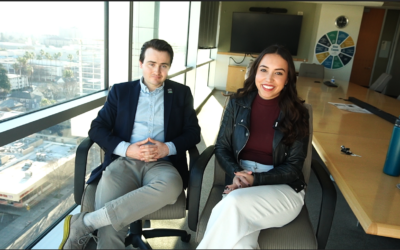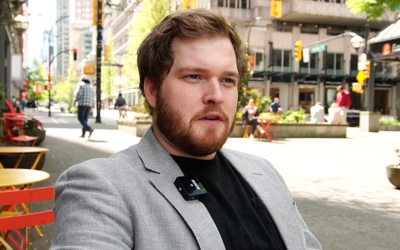Ask the Experts: How UrbanLogiq Helps Transportation Professionals
For the first instalment of our Ask the Experts series, we sat down with the City of San José’s Innovation and New Technology Program Manager Jill Mariani, as well as our own Dr. Ahmed Tageldin to discuss how UrbanLogiq helps transportation professionals overcome some of the data challenges that they face today.
Meet the Experts
 Dr. Ahmed Tageldin is a civil engineer with a PhD from the University of British Columbia in Transportation Engineering. Ahmed spent over five years working in the public sector for different municipalities across Metro Vancouver before joining UrbanLogiq in 2022.
Dr. Ahmed Tageldin is a civil engineer with a PhD from the University of British Columbia in Transportation Engineering. Ahmed spent over five years working in the public sector for different municipalities across Metro Vancouver before joining UrbanLogiq in 2022.
Jill Mariani has worked for  the City of San José as the Innovation and New Technology Program Manager for the last five years. She is the recipient of the 2019 American Planning Association Smart City Technology Award for collaboration with UrbanLogiq.
the City of San José as the Innovation and New Technology Program Manager for the last five years. She is the recipient of the 2019 American Planning Association Smart City Technology Award for collaboration with UrbanLogiq.
Ask the Experts
Q: What are some of the biggest data challenges that transportation professionals are dealing with right now?
Jill Mariani: Data siloes — when you’re designing the transportation system for a city and making decisions, whether they be policy decisions, safety decisions, and infrastructure decisions, it’s really important to have as much data as possible, to make the best decision possible. When your data is siloed or isn’t living with the rest of your data, you’re just getting a little piece of what is going on instead of the broader idea of what is occurring on your roadway to make those decisions. You want as much information as possible, not just one piece.
Ahmed Tageldin: Safety analysis — road collisions are one of the major causes of injuries and fatalities around the world. There is always a rising trend in those injuries and fatalities happening and so to solve these problems we have to dive into the data to be able to reduce them and [implement] mitigation methods.
Q: What role can UrbanLogiq play in helping solve these issues?
Jill Mariani: When we were introduced to UrbanLogiq, our biggest challenge was that we had data sets that were not normalized and siloed across an entire department. These data sets lived on people’s computers, on the website, on the internet, and on different platforms. Everyone was using similar data sets but they were just what their team had gathered – even though everyone was gathering the same type of data. It was exciting to us that UrbanLogiq was interested in aggregating it all together so it was normalized so that we could really unlock the power of all of our data.
Dr. Ahmed Tageldin: In the transportation industry there is a big gap between the advancements in the industry and the public sector. A lot of the advancements in the data analysis field come from machine learning and deep learning. Government agencies do not have access to those advancements readily available. I see a lot of potential in reducing that gap between the industry and the government through a data tool that is readily available.
Q: What are the key benefits of having a platform like UrbanLogiq?
Jill Mariani: The biggest benefit of having a platform like UrbanLogiq is that you’re really unlocking a new tool that transforms the way that you make decisions and analyze data. Now because we have the UrbanLogiq platform not only can we make decisions quicker because we are not spending all of our time collecting and then cleaning the data —we are able to just get the clean data and analyze it to make decisions. So we are spending a lot more time doing the important work instead of the really tough manual work that used to take up a lot of time.
Q: How does UrbanLogiq improve collaboration within your agency?
Jill Mariani: Once our data is packaged and useful, we’re able to make it live with other data sets. So before we would never even think about how our data would relate to the police department’s data because it was such a big task to think about getting our data to a format that would be useful to other departments within the city. Now it is a reality — to be able to work with other departments within the city in that way. We are not just unlocking the silos within the department of transportation at this point we are now unlocking the silos that occur within the city between departments as well.
Q: Would you encourage other jurisdictions to adopt UrbanLogiq as a software solution to manage their data?
Jill Mariani: I honestly don’t know how other jurisdictions are doing it without having something like UrbanLogiq. I imagine it’s a lot of spreadsheets. My recommendation to any jurisdiction that is struggling with their data now, is to think about how they are going to manage it ten years from now and start taking a look at what options you have available. Maybe you will come to the same conclusion that we did at the City of San José, which is that the UrbanLogiq platform checked all the boxes for us and it was what we were looking for.
Q: How does this benefit the public?
Jill Mariani: Our public expects services to occur the way they need them to occur. They expect them to be performed quickly, and they expect the best decisions possible to be made. By being able to coordinate across departments and within our own department now — we’re getting closer to being able to reach what their expectations are and what they deserve.
How UrbanLogiq helps transportation professionals
From data capture to analysis, UrbanLogiq’s Data Platform facilitates an integrated approach to data management designed specifically for government. Our Data Platform streamlines data engineering, automates quality control, and supports data workflows and analytics within a single application all secured with embedded cybersecurity and privacy compliance. Contact us today to schedule a 30-minute demo.


